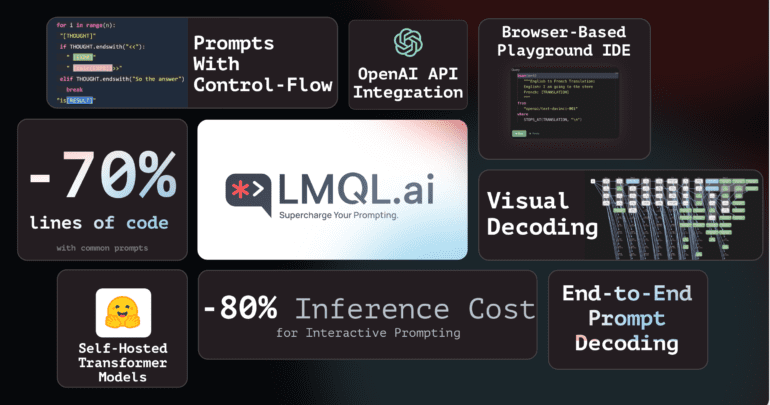TL;DR:
- Large Language Models (LLMs) have made a significant impact across industries such as healthcare, finance, education, and entertainment.
- LMQL, an open-source programming language and platform, enhances the capabilities of LLMs through prompts, constraints, and scripting.
- LMQL simplifies complex prompting flows with minimal code, extending language model programming beyond pure text prompts.
- By integrating constraints and control flow, LMQL enables efficient inference procedures and reduces the need for re-querying and validation.
- LMQL allows users to steer the text generation process to meet desired specifications, enhancing efficiency and accuracy.
- Evaluations demonstrate that LMQL retains or improves accuracy while significantly reducing computation and cost.
- LMQL integrates seamlessly with frameworks like Hugging Face’s Transformers, OpenAI API, and Langchain.
- LMQL’s developer resources and experimentation capabilities are available at lmql.ai.
Main AI News:
The advent of Large Language Models (LLMs) has revolutionized the Artificial Intelligence (AI) landscape, leaving an indelible impact on various industries such as healthcare, finance, education, and entertainment. Remarkable models like GPT, DALLE, and BERT have astounded us with their exceptional abilities, ranging from generating flawless essays and code completion to summarizing lengthy textual passages, emulating human-like question-answering, and effortlessly producing content from minimal language prompts. These LLMs have catapulted the field of AI and Machine Learning into an era of unprecedented progress.
In a groundbreaking endeavor, a team of visionary researchers has introduced LMQL—a cutting-edge, open-source programming language and platform designed to facilitate interaction with LLMs. LMQL, short for Language Model Query Language, elevates the potential of Large Language Models by integrating prompts, constraints, and scripting. As a declarative, Python-based language, LMQL amplifies static text prompting through control flow, constraint-guided decoding, and tool augmentation. By harnessing the power of scripting, LMQL streamlines complex multi-part prompts with minimal lines of code.
Leveraging the capabilities of LMQL, the research team has pioneered Language Model Programming (LMP), a paradigm that extends the boundaries of language model prompting from pure text to a fusion of textual prompts and scripting. By incorporating constraints and control flow within LMP prompts, LMQL empowers the generation of highly efficient inference procedures. These sophisticated and high-level constraints are seamlessly translated into token masks, meticulously enforced during the generation process.
One of the primary motivations behind the development of LMQL is to mitigate the costly and time-consuming process of re-querying and validating generated text. With LMQL, the aim is to produce output that closely aligns with the desired specifications on the initial attempt, eliminating the need for subsequent iterations. Through its versatile constraint system, LMQL enables users to exert fine-grained control over the text generation process. From ensuring adherence to specific grammatical and syntactic rules to avoiding certain words or phrases, LMQL empowers users to shape the generated text to their exact requirements.
The researchers emphasize how LMQL seamlessly incorporates a wide array of state-of-the-art prompting methods, including interactive flows, which are challenging to implement using existing APIs. Through comprehensive evaluations, LMQL has demonstrated its ability to maintain or enhance accuracy across numerous downstream tasks while significantly reducing computation and cost associated with pay-to-use APIs. The results have shown remarkable cost savings ranging from 13% to an impressive 85%.
LMQL provides users with a concise and intuitive means to express both common and advanced prompting techniques. It seamlessly integrates with industry-leading frameworks such as Hugging Face’s Transformers, the OpenAI API, and Langchain. Developer resources and documentation for LMQL can be accessed at lmql.ai, with a user-friendly browser-based Playground IDE available for experimentation and rapid prototyping.
Conclusion:
The introduction of LMQL represents a significant milestone in language model programming. Its revolutionary capabilities empower users to efficiently and accurately shape text generation according to desired specifications. This advancement has the potential to drive innovation and streamline processes across various industries, unlocking new possibilities for AI-driven solutions. As businesses embrace LMQL, they can expect improved efficiency, reduced costs, and enhanced outcomes in their language model programming endeavors.

